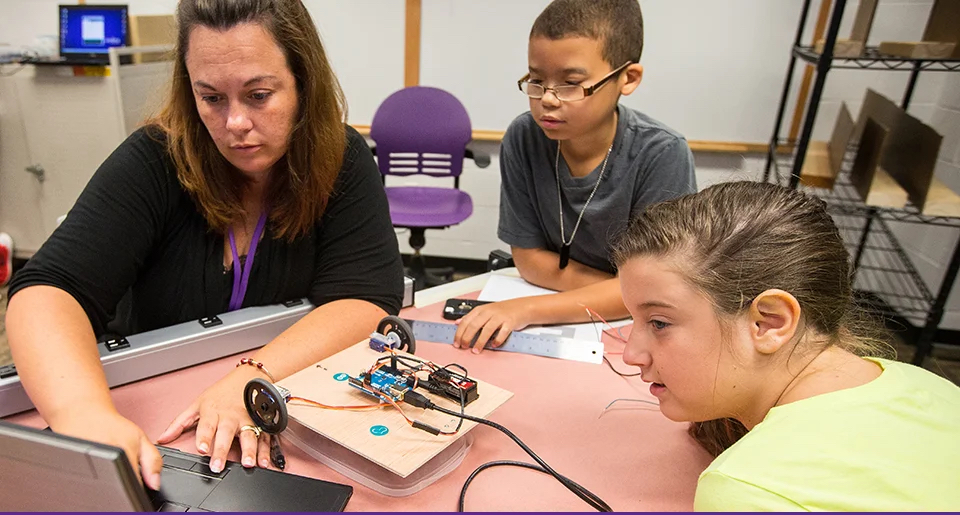East Carolina University Recognized for Continued Innovative Community and Economic Engagement Programs

East Carolina University (ECU) is proud to be a member of an exceptional group of institutions to receive the Innovation & Economic Prosperity Program 5-Year Extension. ECU’s merit can be found in a formal commitment to grow its engagement, innovation, and economic efforts to positively impact the region the university serves, as well as the state of North Carolina and neighbors near and far.
Since ECU first received the prestigious designation at the program’s inception in 2015, the university has committed to being an economic and innovation driver for eastern North Carolina. Inspired by its IEP involvement, ECU has made significant advancements over the past eight years in supporting new knowledge, technologies, and community-embedded clinics to solve significant societal problems. ECU has also worked to strengthen partnerships with other universities and community colleges to unify more tightly around the workforce development, commercialization, manufacturing, and business sustainability needs in eastern North Carolina.
ECU serves 29 of North Carolina’s eastern most counties located between I-95 and the coast. Many of these counties are rural areas that have been identified by the NC Department of Commerce as Tier 1 and Tier 2 counties, meaning they are the most economically distressed in the state. To help bring about true regional transformation, ECU has taken steps to assess, design, and implement innovative strategies that help build more vibrant and competitive communities into pathways toward prosperity.
Through a coordinated, campus-wide approach to connecting with partners across the region, ECU faculty and students work directly with communities, nonprofit organizations, schools, business and industry leaders, military leaders, entrepreneurs, and government officials to assess local issues and offer tangible solutions through collaboration and mutually beneficial partnerships.
For instance, ECU provides regional partner resources, capacity building, project assistance, and training to local government and nonprofit organizations through various offerings like the NCEDA-partnered North Carolina Certified Economic Developer Program. Municipal groups have also benefitted from the knowledge and guidance of faculty, staff, and students who have helped research and build solutions to problems, such as the Choanoke Area HOME consortium where experienced faculty and staff successfully helped northeast counties collectively address the lack of affordable housing.
Continuously focused on innovation-driven initiatives aimed at retaining regional talent and identifying new opportunities that mutually benefit the university and its community, industry, and military partners, ECU has implemented workforce development initiatives like the Tools for Advanced Manufacturing program, which helps veterans grow the skills needed to successfully transition into the civilian workforce. ECU’s Advanced Manufacturing and Innovation Academy engages youth in hands-on activities while introducing them to science and technology careers and advanced manufacturing concepts. The Industrial Technology Transfer Program allows students who have been awarded a qualified Associate in Applied Science degree to earn a Bachelor of Science degree through a program that prepares them for employment in roles involving the management, operation, and maintenance of technological systems.

To further grow regional economic engagement, ECU created programs that connect students with underserved communities in the region. Programs like the Public Fellows Internship funded by State Employees Credit Union Foundation and RISE29 funded by Golden Leaf Foundation have afforded a way for students to engage with and succeed in real-world positions, supporting new job creation while strengthening small businesses, non-profits, and local municipalities.
Faculty development programs, such as the initiation of an annual Purple and Gold Bus Tour, bring faculty and staff from the university into communities throughout the region and anchor a sense of belonging that ignites opportunities for community needs to be met with faculty research expertise. The challenges and opportunities have propelled ECU to engage in multi-university and multi-partner engines that will fuel regional development and global recognition while also contributing to industry needs in eastern North Carolina, including aero-technology, smart-agriculture, and coastal and marine energy resources.
Over the past eight years, ECU faculty and leaders have more strategically worked to serve as co-primary investigators on infrastructure and economic development grants with regional municipality economic developers and managers.
The university is also advancing economic vitality and prosperity through the East Carolina Research and Innovation Campus (ECRIC). ECRIC now includes sites such as the Eastern Region Pharma Center (ERPC) in ECU’s Life Science and Biotechnology Center. ERPC is working in partnership with 15 pharmaceutical companies and five regional community colleges to lead workforce development for the ever-growing pharmaceutical research and manufacturing industry in the state.
Additionally, ECU is committed to positively influencing social mobility by consistently ranking among the nation’s top producers of family physicians (according to the American Academy of Family Physicians) and other health professionals. The university is also committed to continuing to increase the number of engineering graduates to solve global challenges, including recognized excellence in coastal engineering, and leading the UNC system in the graduation of students from Tier 1 and Tier 2 counties.
To further advance ECU’s commitment to innovation and regional transformation, these goals have been integrated throughout the university’s Strategic Plan refresh as a consistent reminder to all faculty, staff, students and institution leaders that the university is focused on and committing to innovative research, mutually beneficial partnerships, and educational solutions.
While ECU has made great strides in impacting the region of eastern North Carolina, the work is just beginning. ECU continues to promote community and institutional partnerships that impact regional economies and well-being while refining our strengths to benefit communities in eastern North Carolina and beyond.
Authors:
- Dr. Sharon Paynter, ECU’s Acting Chief Research and Engagement Officer
- Dr. Angela Lamson, ECU’s Interim Assistant Vice Chancellor for Economic and Community Engagement
- Kim Tilghman, ECU Communications Specialist
- Commission on Economic & Community Engagement
- IEP



Stay Connected
X (formerly Twitter)
Facebook
YouTube
LinkedIn
RSS